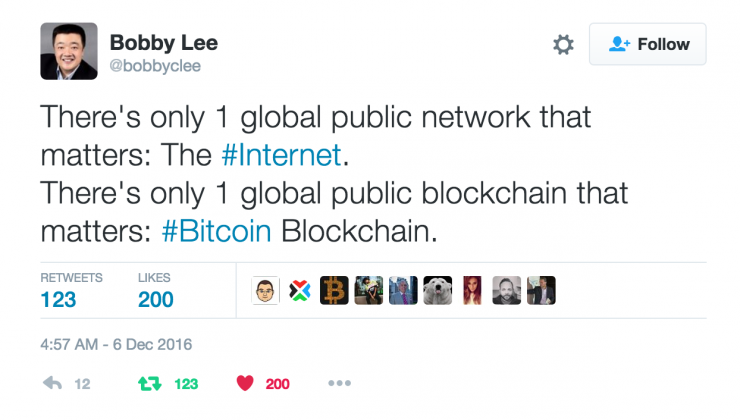
This week BTCC CEO, Bobby Lee, posted a compelling Tweet and was not afraid to voice his view in full support of the Bitcoin Blockchain.
A Conversation with BTCC CEO, Bobby Lee
I had the chance to interview Bobby Lee for an in-depth look at why this industry leader continues to stand firm in support of the number one global public blockchain: Bitcoin.

Elizabeth McCauley (EM): When did you first discover Bitcoin? What attracted you most to the concept of this digital currency?
Bobby Lee (BL): I first discovered Bitcoin in early 2011, through my brother Charlie. At the time, I remember thinking that this was a cool new concept, the idea of digital currencies. Immediately, I was perplexed as to why this hadn’t been done before; that the simple concept of digital currencies didn’t get invented until 2008. Through the next few months, I finally started to slowly learn about the concepts of decentralization, and challenges of double spending for a digital currency, and how it all finally came together in Bitcoin in 2008. As an investor in gold, I was immediately attracted to the similarities of Bitcoin with Gold, and then also started questioning myself what are the actual underlying reasons why gold is valuable. Is it the color, or properties, or just group-think; What actually made gold valuable? and likewise, what makes Bitcoin valuable?
EM: Your tweet from earlier today was a bold statement. Can you share why you were prompted to push that out? Perhaps share your thoughts on the recent trends towards private blockchain.
BL: What prompted that tweet was an event I attended during the day. I went to yet another seminar that afternoon, organized by the banking sector, which had different speakers all extolling the virtues of blockchain, decentralized ledgers, and how revolutionary it was. Yet almost all of them, either purposely or not, left Bitcoin on the sidelines while talking about blockchains and DLTs as world-changing. I thought to myself, this is mad!
You can’t blame them, that Bitcoin has had a rough start, with tainted media stories in the last few years. However, I do think it’s also the lack of understanding, that lead to this result of people embracing blockchains, wanting to take it private, and at the same time, sort of dismiss Bitcoin.
For me, Blockchain is only innovative if we’re referring to its new features invented in 2008 by Satoshi Nakamoto. I believe that for something to qualify as Blockchain, it specifically has to be permission-less. It is this permission-less aspect that makes blockchains “public”. In other words, the innovation is the permission-less and “public” nature of blockchain. Consequently, Private Blockchains do not really qualify as “blockchains” by my definition, and therefore is not innovation in the “invented in 2008” sense. Private Blockchains are just merely distributed shared databases, that have been successfully deployed in production since the 1980’s.
EM: What is the current outlook for Bitcoin in China?
BL: The outlook is quite exciting. There’s lots of interest in Bitcoin in several aspects, as a new technology in the growing space of FinTech, as a store of value in digital assets (in the cloud), as a source of income for businesses venturing into Bitcoin mining, and finally, also as a speculative trading vehicle. And most importantly, the central bank itself has declared that they are closely studying the concept of digital currencies, and wants to apply it in practice.
EM: What has been most significant in shaping your view to support Bitcoin blockchain solutions over private non-Bitcoin blockchain solutions?
BL: The issue here, what most outsiders don’t fully understand yet, is that you want Blockchain to be immutable. Immutability is also a key tenant of the new Blockchain concept. In other words, it is the immutability that makes Blockchain special and different from anything that came before it. Well then, how do you get immutability? The way to do it is to have a very strong Blockchain, that is decentralized and very difficult for someone to take over. Today, only the Bitcoin Blockchain satisfies that criteria, because it’s the most dominant blockchain, in both market circulation value terms, as well as raw Proof-of-Work computational hashing power. And what is unfortunate for all other blockchains and AltCoins, is that Bitcoin’s lead here is insurmountable, and it’s a self-reinforcing cycle. Personally, I see no other outcome than Bitcoin being more and more as The ONLY Blockchain that matters. All other interested and application-specific blockchains would (and should) need to anchor to Bitcoin, sort of like sidechain solutions.
EM: What must be done to keep Bitcoin current in a dialogue with more and more push towards private non-Bitcoin blockchains?
BL: I don’t think anything needs to be done per se. If what I say is right, then those who venture off the path will eventually realize the mistakes, and come back and anchor their blockchains onto the main Bitcoin Blockchain. Let them go figure it out. I’m just trying to improve awareness and do some education here, based on my observations and learnings over the past few years.
"Private Blockchains reminds me of Private Intranets. Private Intranets sound great, but they’re ultimately really not useful unless they’re connected to the Public Internet. So for Private Blockchains, they should consider anchoring to the public Bitcoin Blockchain, to achieve real immutability"
EM: What do you see as the killer use case for Bitcoin where private non-Bitcoin blockchains will not measure up?
BL: The killer use case of Bitcoin is money. Yes, transfer of value, digitally, using blockchain. Over here at BTCC, we have a very exciting new wallet coming up, call Mobi. We think this is the killer use case for Bitcoin, to use Bitcoin as real money. Mobi will be global money: for Anyone, at Anywhere, in Any Currency. “Bitcoin as Money”, it’s the killer use case that’s been hiding in plain sight.
So Much Potential
Bitcoin community members and leaders like Lee caution a flight to more temporarily “flashy” concepts and to understand and grasp the potential of Bitcoin. There frankly is much-untapped potential that a public blockchain provides. During our interview Lee noted:
“Private Blockchains reminds me of Private Intranets. Private Intranets sound great, but they’re ultimately really not useful unless they’re connected to the Public Internet. So for Private Blockchains, they should consider anchoring to the public Bitcoin Blockchain, to achieve real immutability.”
According to Lee, Bitcoin just cannot be left out of the equation, especially when discussing blockchain solutions to change the world. Lee shared what prompted him to tweet:
""""What prompted that tweet was an event I attended during the day. I went to yet another seminar that afternoon, organized by the banking sector, which had different speakers all extolling the virtues of blockchain, decentralized ledgers, and how revolutionary it was. Yet almost all of them, either purposely or not, left Bitcoin on the sidelines while talking about blockchains and DLTs as world-changing. I thought to myself, this is mad!""""
Of course, anyone can develop a private blockchain solution, but Bitcoin continues to not only serve as an alternative currency but a public blockchain with the essential trait of immutability.
What are your thoughts on private blockchains? Is the Bitcoin blockchain still the number one blockchain? Share your thoughts in the comments below
Hi! I am a robot. I just upvoted you! I found similar content that readers might be interested in:
https://news.bitcoin.com/blockchain-matters-interview-bobby-lee/
Downvoting a post can decrease pending rewards and make it less visible. Common reasons:
Submit